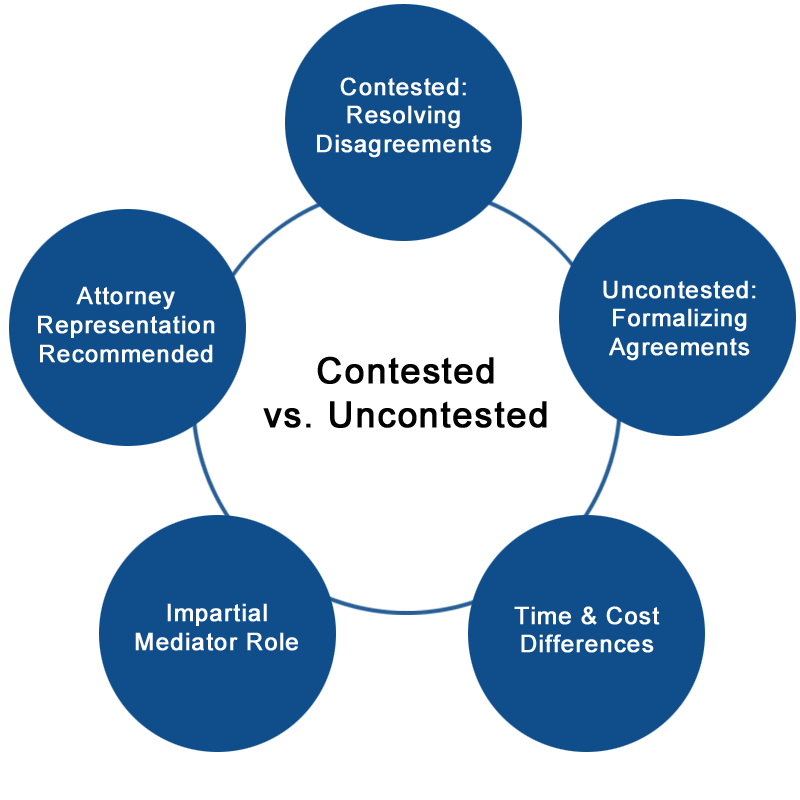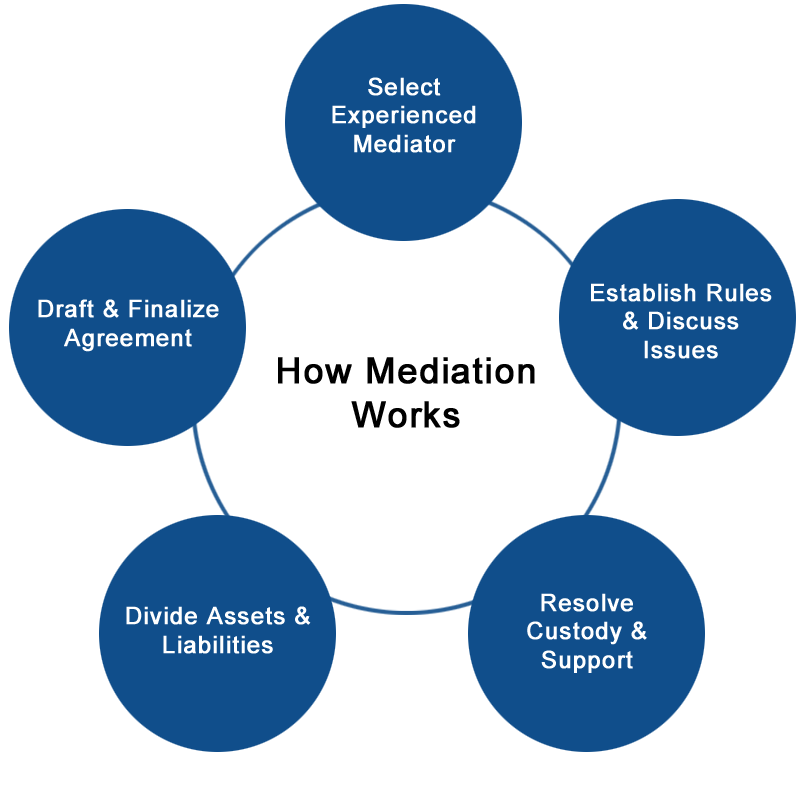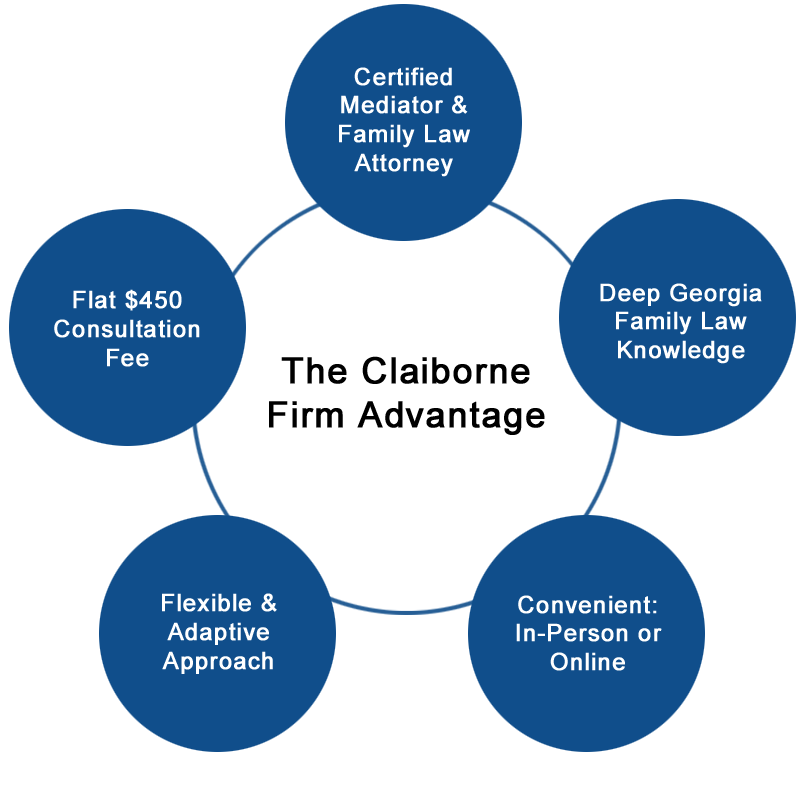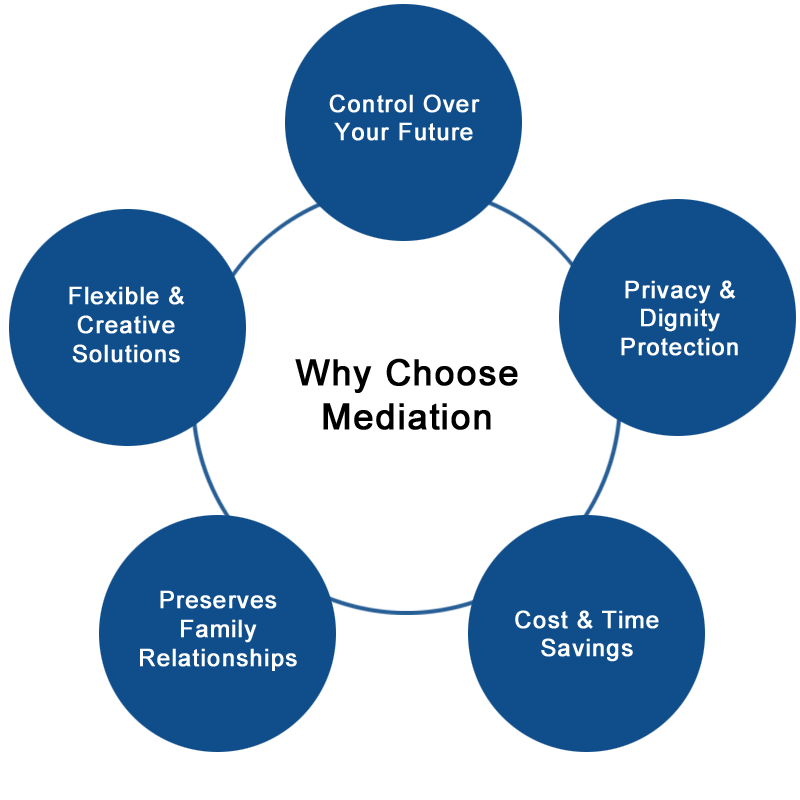
Divorce Mediation in Georgia
During the heat of an emotional and challenge divorce process, some couples may find themselves needlessly dragging the process out by trying to “win” or to prove that they are right. In many cases, they will eventually find that the prolonged stress that this mindset creates, not to mention the financial hardship and emotional toll it creates, is simply not worth being able to say that one or the other party “won.” Because at the end of the day, a judge will be the one to make the final decision on the outcome, dividing assets as they see fit. And eventually both parties will come to realize that the judge’s conception of fairness may not align with their own.
It’s when they abandon this mindset of winners and losers that many couples discover a more positive way to view their situation. Namely, they discover mediation. This collaborative approach to dividing marital assets and dissolving the marriage allows both parties to work toward a mutually beneficial agreement, one that is fair to both parties and helps avoid a costly and prolonged court battle.
The financial savings in court fees alone – often totaling tens of thousands in dollars – is enough to make mediation an attractive alternative. When you factor in how this approach encourages cooperation, helping to preserve relationships between the spouses and their children, it becomes an even more beneficial way to approach divorce. At The Claiborne Firm, we proudly offer an online solution that can help resolve differences through mediation in 45 days or less.
Why Divorce Mediation is Valuable
As an alternative to a traditional court dispute, mediation allows couples who are going through a divorce to come together and resolve issues ranging from child custody and support to division of property and possible arrangements for alimony. Best of all, it gives each party control over the decisions that will impact their future and their relationship with their children, rather than trusting a judge’s verdict.
It’s more than just a process of settling legal matters. Mediation empowers a divorcing couple, keeping their privacy protected during an incredibly stressful transition for both parties. By its nature, it gives them space to pursue creative solutions that suit both parties, helping each preserve their dignity, their emotional well-being, their familiar relationships and their finances. It’s also far more desirable when children are involved, as it places a greater emphasis on maintaining parental bonds.
Contrast that with a typically adversarial court case, one that is often expensive, slow and inflexible, putting the crucial final decision in the hands of a judge who many not completely grasp the unique circumstances of the family’s situation. Plus, litigation makes every aspect of the case a matter of public record. Mediation lets a couple avoid all of these pitfalls while keeping their private lives private and greatly enhancing their long-term stability and relationships.
Mediation in Contested vs. Uncontested Divorce
By definition, contested divorce is one where there is a disagreement about one or more major issues, whether it’s spousal support, child custody or property division. If the couple finds themselves unable to come to an agreement on their own, mediation helps to resolve them by involving an impartial mediator. This mediator can help find pathways to compromise by facilitating communication that helps reach a mutually beneficial arrangement. Because both parties are approaching mediation from a place of opposition, the process may be more time-consuming than typical mediation, but it will still be faster and cheaper than a drawn-out court battle. If successful, the process finds outcomes that work for both spouses. If not, it could proceed to court where the final decision will be in the hands of a judge.
 Uncontested divorce, as the name implies, comes when both spouses have already reached an agreement on the major issues of a divorce – division of assets, child custody, alimony, etc. – and wish to end the marriage peacefully. In these cases, mediation is often just a means of formalizing those decisions, ensuring that they have been reached fairly, clearly and in a way that makes them legally binding. By documenting these agreements, both parties have a clear picture of what the outcome will be. This process is usually far more simple and smooth than contested mediation, and allows for the divorce to be finalized far faster.
Uncontested divorce, as the name implies, comes when both spouses have already reached an agreement on the major issues of a divorce – division of assets, child custody, alimony, etc. – and wish to end the marriage peacefully. In these cases, mediation is often just a means of formalizing those decisions, ensuring that they have been reached fairly, clearly and in a way that makes them legally binding. By documenting these agreements, both parties have a clear picture of what the outcome will be. This process is usually far more simple and smooth than contested mediation, and allows for the divorce to be finalized far faster.
The key difference between the two is the number of issues that the two spouses disagree on. This disagreement level adds to the complexity and cost of a contested divorce vs an uncontested divorce. So in essence, contested divorce mediation helps make a costly and frustrating process less so, while uncontested divorce simply formalizes the elements of the divorce that have already been agreed upon.
It’s important to note that, while the mediator’s job is to remain impartial, it can be important for each spouse to have their own attorney present – especially in contested divorces. This way, each party’s lawyer can be on hand to ensure that their rights are preserved, they are represented well, and they have full understanding of the law and the process. This gives everyone peace of mind that their interests are being served, and a fair settlement has been reached.
The Mediation Process
The first step in mediation is to select an experienced mediator, generally an attorney who has experience in family law. As a neutral party, they will collect all necessary information from both parties, such as financial and personal background, to better understand the situation. From there, the meditation sessions will begin, with the couple meeting in person or online with the mediator to discuss key issues. This process generally follows this order:
- •
 Establish ground rules and sign confidentiality agreements
Establish ground rules and sign confidentiality agreements - • Deliver opening statements
- • Establish plan for child custody, including legal and physical custody plus visitation schedules
- • Create guidelines for child support, including care factors such as health insurance and medical expenses
- • Divide marital assets, including homes, vehicles, bank accounts, retirement savings, investments, personal property, business interests, life insurance, debts and liabilities
- • Determine spousal support amount, duration and payment structure and ensure financial security
- • Estimate future child raising expenses such as college tuition, daycare and extracurriculars
- • Establish tax liability from factors such as dependency claims, liabilities or refunds
- • Determine division of attorney fees and mediation costs
By coming to an agreement on all of these factors, the mediator is able to draft a settlement agreement. This may require multiple sessions, as emotions and differing priorities may lead to disagreements on certain details, but once the agreement has been reached it can be submitted to court for approval. Once it receives that approval, it becomes legally binding.
The collaborative and thorough nature of the mediation process creates a less stressful, expensive and rigid method for resolve a divorce while preserving relationships between parents and children. It also allows for greater control, as the couple determines their own outcome rather than leaving it to a judge, while keeping private matters from the public record.
Both parties in the divorce approaching the process with commitment to finding common ground, respect for one another, and with a clear vision of what they’d like to achieve is the best-case scenario for divorce mediation. Having all necessary documentation on hand, such as lists of assets and financial records, makes the entire process move smoothly, letting the mediator focus on giving each spouse a chance to be heard and understood. When all goes well, an agreement on major issues from child support to alimony can be reached in just a few sessions, letting the couple create a legally binding document that protects themselves, their financial future, their family, their dignity and their peace of mind, without ever appearing in court.
Frequently Asked Questions
What happens if a couple can’t reach an agreement during mediation?
While the mediation process is far more collaborative and cooperative than a trial, it can still leave certain issues unanswered. If a couple is unable to agree on certain aspects of the divorce, such as child custody or division of assets, the mediator will make note of those disagreements and submit them to the court.
The couple then has two choices. They can litigate those particular issues in court, or schedule more mediation sessions to come to an agreement. Further sessions could be beneficial, particularly in contested divorces, to ensure both sides have time to calmly and fully consider all the options in front of them. Otherwise, the judge will have the final say on unresolved matters during divorce litigation which can include further hearings, a trial, or further court-ordered mediation sessions.
How much does divorce cost?
As mediators typically charge by the hour, often splitting the fee between parties, there are several factors that determine how much mediation can cost. If both parties come to the table prepared with a clear accounting of their finances, a willingness to work together and a clear set of expectations, mediation will take less time and thus cost less. If they arrive unprepared and unwilling to compromise, mediation may require multiple sessions – which will still likely be less expensive than reaching an agreement in court.
At The Claiborne Firm, every mediation case, whether contested or uncontested, begins with a flat consultation fee of $450 for a case evaluation. This initial consultation will give each party a chance to express their concerns and ask questions of the mediator, and attorney and a paralegal in a confidential setting. Once the consultation is over, both parties will have a clear understanding of what to expect from the process as well as how much they will pay. This will take the form of a personalized retainer customized to their unique situation.
What happens after mediation?
Once an agreement has been reached at the end of mediation, either the mediator or an attorney representing one of the spouses will draft a settlement agreement to be signed and reviewed by both. This agreement is then filed with the Superior Court who is handling the case and reviewed by a judge. If the judge finds that the terms meet legal standards for Georgia law, they will approve it and incorporate it into the Final Judgement and Decree of Divorce. In uncontested divorces, this agreement can be submitted without formal hearing depending on your county. A few counties throughout Georgia require one or both spouses to make a brief appearance to confirm on record the settlement’s parameters.
Once the divorce petition is filed with the court, Georgia law requires a 30-day waiting period before the divorce can be finalized. Assuming both parties make a good faith effort during mediation and the process goes smoothly, the entire divorce from beginning to end can be finalized in as little as 45 days.
Are there resources available for children?
Even though divorce is entirely an issue between parents, children will often blame themselves. Counseling can help guide them through the process in a safe environment with minimal emotional impact. These counseling sessions can be held with just the child or the entire family present, showing kids that their parents are dedicated to their well-being and giving parents tools to navigate the stress a divorce can bring to a child. It also demonstrates to the child that they are not at fault, helping build stronger co-parenting bonds.
 How the Claiborne Firm Can Help
How the Claiborne Firm Can Help
A mediator is trained for conflict resolution and cooperation. A divorce attorney is trained to shield their clients’ rights under the law. These two roles work in tandem to make the process as painless as possible while ensuring each couple is protected. As a certified mediator and experienced family law attorney, Will Claiborne of The Claiborne Firm is equally adept in both roles, helping couples navigate the conflict and emotional strain of a divorce.
His deep understanding of the procedures and tenets of Georgia family law lets him foresee complexities before they become an issue. His mediation skills ensure everything is approached from a standpoint of fairness and neutrality, which can be vital during heated disputes. Ultimately, it’s about building understanding and fostering cooperation between both parties, crafting it on a foundation of thorough mastery of the law. The result is mediation that preserves family relationships, lets parents share in the milestones of their children’s lives long after the marriage is over, and provides a pathway to a fair and lasting solution for far less than a drawn-out court trial.
No matter where in Georgia you live, he can help guide you over Zoom or in person, giving you access to his balanced and flexible approach that adapts to your needs. Facilitative when communication is key, knowledgeable when legal questions arise, and always committed to his clients, his methods have led to countless successful outcomes across the state.
Whether one session or a series of them, he ensures an honest and transparent process that helps you avoid the stress of litigation. But should it become necessary, he’s just as committed to protecting your rights in court.
Call today to schedule a consultation for a flat $450 fee, and let us build a foundation of trust and cooperation that will guide you through divorce with dignity, respect and confidence.
Areas Serviced:
Abbeville, GA
Acworth, GA
Adairsville, GA
Adel, GA
Adrian, GA
Ailey, GA
Alamo, GA
Alapaha, GA
Albany, GA
Aldora, GA
Allenhurst, GA
Allentown, GA
Alma, GA
Alpharetta, GA
Alston, GA
Alto, GA
Ambrose, GA
Americus, GA
Andersonville, GA
Arabi, GA
Aragon, GA
Arcade, GA
Argyle, GA
Arlington, GA
Arnoldsville, GA
Ashburn, GA
Athens, GA
Atlanta, GA
Attapulgus, GA
Auburn, GA
Augusta, GA
Austell, GA
Avalon, GA
Avera, GA
Avondale Estates, GA
Baconton, GA
Bainbridge, GA
Baldwin, GA
Ball Ground, GA
Barnesville, GA
Bartow, GA
Barwick, GA
Baxley, GA
Bellville, GA
Berkeley Lake, GA
Berlin, GA
Bethlehem, GA
Between, GA
Bishop, GA
Blackshear, GA
Blairsville, GA
Blakely, GA
Bloomingdale, GA
Blue Ridge, GA
Bluffton, GA
Blythe, GA
Bogart, GA
Boston, GA
Bostwick, GA
Bowdon, GA
Bowersville, GA
Bowman, GA
Braselton, GA
Braswell, GA
Bremen, GA
Brinson, GA
Bronwood, GA
Brookhaven, GA
Brooklet, GA
Brooks, GA
Broxton, GA
Brunswick, GA
Buchanan, GA
Buckhead, GA
Buena Vista, GA
Buford, GA
Butler, GA
Byromville, GA
Byron, GA
Cadwell, GA
Cairo, GA
Calhoun, GA
Camak, GA
Camilla, GA
Canon, GA
Canton, GA
Carl, GA
Carlton, GA
Carnesville, GA
Carrollton, GA
Cartersville, GA
Cave Spring, GA
Cecil, GA
Cedartown, GA
Centerville, GA
Centralhatchee, GA
Chamblee, GA
Chatsworth, GA
Chattahoochee Hills, GA
Chauncey, GA
Chester, GA
Chickamauga, GA
Clarkesville, GA
Clarkston, GA
Claxton, GA
Clayton, GA
Clermont, GA
Cleveland, GA
Climax, GA
Cobbtown, GA
Cochran, GA
Cohutta, GA
Colbert, GA
College Park, GA
Collins, GA
Colquitt, GA
Columbus, GA
Comer, GA
Commerce, GA
Concord, GA
Conyers, GA
Coolidge, GA
Cordele, GA
Cornelia, GA
Covington, GA
Crawford, GA
Crawfordville, GA
Culloden, GA
Cumming, GA
Cusseta, GA
Cuthbert, GA
Dacula, GA
Dahlonega, GA
Daisy, GA
Dallas, GA
Dalton, GA
Damascus, GA
Danielsville, GA
Danville, GA
Darien, GA
Dasher, GA
Davisboro, GA
Dawson, GA
Dawsonville, GA
Dearing, GA
Decatur, GA
Deepstep, GA
Demorest, GA
Denton, GA
De Soto, GA
Dexter, GA
Dillard, GA
Doerun, GA
Donalsonville, GA
Dooling, GA
Doraville, GA
Douglas, GA
Douglasville, GA
Dublin, GA
Dudley, GA
Duluth, GA
Dunwoody, GA
Du Pont, GA
East Dublin, GA
East Ellijay, GA
Eastman, GA
East Point, GA
Eatonton, GA
Echols County, GA
Edge Hill, GA
Edison, GA
Elberton, GA
Ellaville, GA
Ellenton, GA
Ellijay, GA
Emerson, GA
Enigma, GA
Ephesus, GA
Eton, GA
Euharlee, GA
Fairburn, GA
Fairmount, GA
Fargo, GA
Fayetteville, GA
Fitzgerald, GA
Flemington, GA
Flovilla, GA
Flowery Branch, GA
Folkston, GA
Forest Park, GA
Forsyth, GA
Fort Gaines, GA
Fort Oglethorpe, GA
Fort Valley, GA
Franklin, GA
Franklin Springs, GA
Funston, GA
Gainesville, GA
Garden City, GA
Garfield, GA
Gay, GA
Geneva, GA
Georgetown, GA
Gibson, GA
Gillsville, GA
Girard, GA
Glennville, GA
Glenwood, GA
Good Hope, GA
Gordon, GA
Graham, GA
Grantville, GA
Gray, GA
Grayson, GA
Greensboro, GA
Greenville, GA
Griffin, GA
Grovetown, GA
Gumbranch, GA
Guyton, GA
Hagan, GA
Hahira, GA
Hamilton, GA
Hampton, GA
Hapeville, GA
Haralson, GA
Harlem, GA
Harrison, GA
Hartwell, GA
Hawkinsville, GA
Hazlehurst, GA
Helen, GA
Hephzibah, GA
Hiawassee, GA
Higgston, GA
Hiltonia, GA
Hinesville, GA
Hiram, GA
Hoboken, GA
Hogansville, GA
Holly Springs, GA
Homeland, GA
Homer, GA
Homerville, GA
Hoschton, GA
Hull, GA
Ideal, GA
Ila, GA
Iron City, GA
Irwinton, GA
Ivey, GA
Jackson, GA
Jacksonville, GA
Jakin, GA
Jasper, GA
Jefferson, GA
Jeffersonville, GA
Jenkinsburg, GA
Jersey, GA
Jesup, GA
Johns Creek, GA
Jonesboro, GA
Junction City, GA
Kennesaw, GA
Keysville, GA
Kingsland, GA
Kingston, GA
Kite, GA
LaFayette, GA
LaGrange, GA
Lake City, GA
Lakeland, GA
Lake Park, GA
Lavonia, GA
Lawrenceville, GA
Leary, GA
Leesburg, GA
Lenox, GA
Leslie, GA
Lexington, GA
Lilburn, GA
Lilly, GA
Lincolnton, GA
Lithonia, GA
Locust Grove, GA
Loganville, GA
Lone Oak, GA
Lookout Mountain, GA
Louisville, GA
Lovejoy, GA
Ludowici, GA
Lula, GA
Lumber City, GA
Lumpkin, GA
Luthersville, GA
Lyerly, GA
Lyons, GA
McCaysville, GA
McDonough, GA
McIntyre, GA
Macon, GA
McRae–Helena, GA
Madison, GA
Manassas, GA
Manchester, GA
Mansfield, GA
Marietta, GA
Marshallville, GA
Martin, GA
Maxeys, GA
Maysville, GA
Meansville, GA
Meigs, GA
Menlo, GA
Metter, GA
Midville, GA
Midway, GA
Milan, GA
Milledgeville, GA
Millen, GA
Milner, GA
Milton, GA
Mitchell, GA
Molena, GA
Monroe, GA
Montezuma, GA
Monticello, GA
Montrose, GA
Moreland, GA
Morgan, GA
Morganton, GA
Morrow, GA
Morven, GA
Moultrie, GA
Mountain City, GA
Mountain Park, GA
Mount Airy, GA
Mount Vernon, GA
Mount Zion, GA
Nahunta, GA
Nashville, GA
Nelson, GA
Newborn, GA
Newington, GA
Newnan, GA
Newton, GA
Nicholls, GA
Nicholson, GA
Norcross, GA
Norman Park, GA
North High Shoals, GA
Norwood, GA
Nunez, GA
Oak Park, GA
Oakwood, GA
Ochlocknee, GA
Ocilla, GA
Oconee, GA
Odum, GA
Offerman, GA
Oglethorpe, GA
Oliver, GA
Omega, GA
Orchard Hill, GA
Oxford, GA
Palmetto, GA
Parrott, GA
Patterson, GA
Pavo, GA
Peachtree City, GA
Peachtree Corners, GA
Pearson, GA
Pelham, GA
Pembroke, GA
Pendergrass, GA
Perry, GA
Pinehurst, GA
Pine Lake, GA
Pine Mountain, GA
Pineview, GA
Pitts, GA
Plains, GA
Plainville, GA
Pooler, GA
Portal, GA
Porterdale, GA
Port Wentworth, GA
Poulan, GA
Powder Springs, GA
Pulaski, GA
Quitman, GA
Ranger, GA
Ray City, GA
Rayle, GA
Rebecca, GA
Register, GA
Reidsville, GA
Remerton, GA
Rentz, GA
Resaca, GA
Rest Haven, GA
Reynolds, GA
Rhine, GA
Riceboro, GA
Richland, GA
Richmond Hill, GA
Riddleville, GA
Rincon, GA
Ringgold, GA
Riverdale, GA
Roberta, GA
Rochelle, GA
Rockmart, GA
Rocky Ford, GA
Rome, GA
Roopville, GA
Rossville, GA
Roswell, GA
Royston, GA
Rutledge, GA
St. Marys, GA
Sale City, GA
Sandersville, GA
Sandy Springs, GA
Santa Claus, GA
Sardis, GA
Sasser, GA
Savannah, GA
Scotland, GA
Screven, GA
Senoia, GA
Shady Dale, GA
Sharon, GA
Sharpsburg, GA
Shellman, GA
Shiloh, GA
Siloam, GA
Sky Valley, GA
Smithville, GA
Smyrna, GA
Snellville, GA
Social Circle, GA
Soperton, GA
South Fulton, GA
Sparks, GA
Sparta, GA
Springfield, GA
Stapleton, GA
Statesboro, GA
Statham, GA
Stillmore, GA
Stockbridge, GA
Stone Mountain, GA
Stonecrest, GA
Sugar Hill, GA
Summertown, GA
Summerville, GA
Sumner, GA
Sunny Side, GA
Surrency, GA
Suwanee, GA
Swainsboro, GA
Sycamore, GA
Sylvania, GA
Sylvester, GA
Talbotton, GA
Talking Rock, GA
Tallapoosa, GA
Tallulah Falls, GA
Talmo, GA
Tarrytown, GA
Taylorsville, GA
Temple, GA
Tennille, GA
Thomaston, GA
Thomasville, GA
Thomson, GA
Thunderbolt, GA
Tifton, GA
Tiger, GA
Tignall, GA
Toccoa, GA
Toomsboro, GA
Trenton, GA
Trion, GA
Tucker, GA
Tunnel Hill, GA
Turin, GA
Twin City, GA
Tybee Island, GA
Tyrone, GA
Ty Ty, GA
Unadilla, GA
Union City, GA
Union Point, GA
Uvalda, GA
Valdosta, GA
Varnell, GA
Vernonburg, GA
Vidette, GA
Vienna, GA
Vidalia, GA
Villa Rica, GA
Waco, GA
Wadley, GA
Waleska, GA
Walnut Grove, GA
Walthourville, GA
Warm Springs, GA
Warner Robins, GA
Warrenton, GA
Warwick, GA
Washington, GA
Watkinsville, GA
Waverly Hall, GA
Waycross, GA
Waynesboro, GA
Webster County, GA
West Point, GA
Whigham, GA
White, GA
White Plains, GA
Whitesburg, GA
Willacoochee, GA
Williamson, GA
Winder, GA
Winterville, GA
Woodbine, GA
Woodbury, GA
Woodland, GA
Woodstock, GA
Woodville, GA
Woolsey, GA
Wrens, GA
Wrightsville, GA
Yatesville, GA
Young Harris, GA
Zebulon, GA
Call (912) 351-8775 or Schedule a Free Case Evaluation Online

